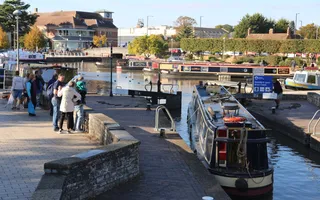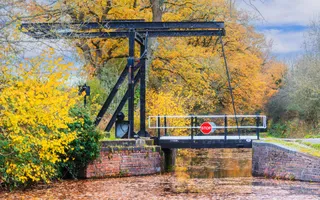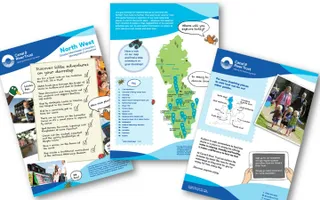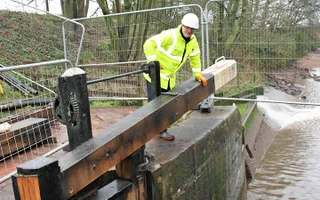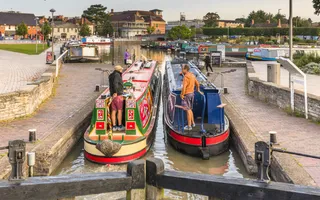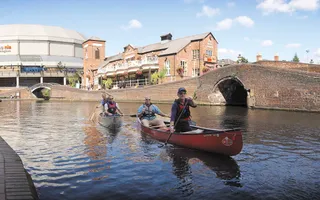The Stratford-upon-Avon Canal runs from Birmingham's suburbia to Shakespeare's Stratford in 25 picturesque miles.
The canal is usually considered as a northern and a southern section.
The Northern Stratford starts at Kings Norton Junction, with its guillotine-gated stop-lock that prevented water loss from one company's line to the other. It continues on the same level for ten miles then descends by 19 locks to Kingswood Junction, where there is a link to the Warwick & Birmingham Canal (now the Grand Union Canal).
The South Stratford is memorable for its split bridges, built with a gap to allow the tow ropes of the boat horses to pass through, and its unique barrel-roofed lock cottages.
The charming conservation area of Wootton Wawen has many ancient timber-frames houses. Nearby is Edstone, or Bearley, Aqueduct, with its cast-iron trough.
Just before Stratford, the canal passes through the tiny village of Wilmcote, where you can stop and visit Mary Arden's house. The historic half-timbered Tudor farmhouse was home to Shakespeare's mother before she was married.
The canal joins the River Avon at the Bancroft Basin in Stratford-upon-Avon, where a pretty park and waterfront paths are overlooked by the famous Royal Shakespeare Theatre.
Days out in Stratford
Bancroft Canal Basin, on the Stratford-upon-Avon Canal, lies in the heart of historic Stratford. Surrounded by beautiful gardens, it's easy to miss this hidden gem.
The history of the Stratford-upon-Avon Canal
The Stratford-upon-Avon Canal was promoted by an Act of 1793. By the time construction reached Hockley Heath in 1796, most of the money had been spent. More was raised, enabling work to start again, and the canal was joined to the Warwick & Birmingham Canal in 1802. It was not until 1812 that yet more money was raised and the cutting continued. The link to the River Avon at Stratford was completed in 1816.
As on most canals, the principal traffic was coal. Some of this went on from Stratford down the river Avon to Evesham, other across Clopton Bridge and along the Stratford & Moreton tramway, which had opened in 1828.
Railway lines
In 1845 the Oxford, Worcester & Wolverhampton Railway proposed building a line from Moreton-in-the-Marsh via Stratford to Birmingham. It offered to buy the tramway and the canal, an offer which was readily accepted.
Traffic diminished, but the railway company (from 1863 the Great Western Railway) had the legal obligation to keep the canal open. However, by the Second World War the southern section was almost unnavigable.
Protests
To the north, the canal owners fixed one of the swing bridges permanently shut. It soon became the scene of a number of incidents, where protesters including Sir Peter Scott aboard his boat Beatrice, insisted it be moved as it was blocking a statutory right of navigation.
Meanwhile, the South Stratford Canal quietly decayed. But when Warwickshire County Council announced it was closing the canal by lowering a bridge at Wilmcote, public outcry prompted a campaign for restoration. Proposals for closure were stymied at the eleventh hour by a canoeist who produced a toll ticket less than three years old, proving that boats still wanted to navigate the canal.
Having avoided closure, the Southern Stratford was taken over by the National Trust. By utilising a combination of volunteers, army personnel and prisoners, the canal was restored at reportedly less than half the estimated cost of filling it in. It was reopened by HM The Queen Mother in 1964. In 1988, the National Trust handed the Southern Stratford-upon-Avon Canal back to us and together with the North Stratford it now forms part of the Avon Cruising Ring.
Where does the water come from?
Wilmcote
The water at Wilmcote Locks comes south from Kingswood Junction, where the Stratford Canal meets the Grand Union Canal. Reservoirs feeding this part of the canal network include Earlswood Lakes {16 canal miles away), Rotton Park Reservoir in Birmingham and Upper Bittel! and Cofton Reservoirs near Alvechurch. Water may also come from Olton Reservoir on the 10 a Mile Pound of the Grand Union Canal.
Earlswood Lakes have a total of 692 million litres (megalitres). Unlike most reservoirs, water from them is pumped up into the canal.
It takes more than two and a half days to transfer water from Earlswood lakes to the top of Wilmcote Locks.
Wilmcote Top Lock is emptied and filled over 3000 times in an average year, using more than 300 megalires of water. The 11 locks at Wilmcote are spread over just under a mile and drop the canal down around 77 feet.
Some water flows into the canal from local streams called feeders.


